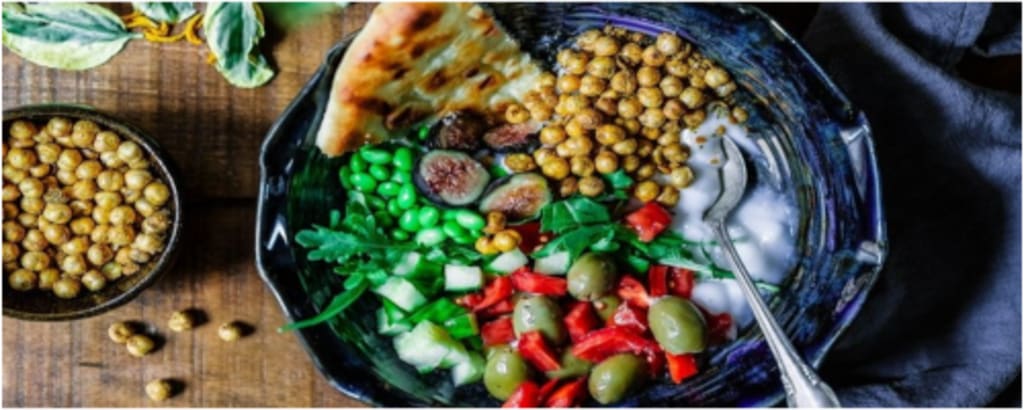Veganism For The Elderly
you are what you eat

Recent statistics show that more and more seniors are considering a vegan diet in an attempt to improve their overall health and prevent disease. One poll showed that about 2.7% of adults between the ages of 55 and 64 are vegetarian, while 1.8% of adults above 65 have taken this lifestyle.
If you are considering a vegan diet, you may wonder whether you can stay active and healthy with a plant-based diet. In this article, we will discuss the different types of vegetarians and how seniors can ensure they get all their dietary needs.
________________________________________
Different Types of Vegetarians
When you hear the word "vegetarian," what comes to your mind? To many, being a vegetarian means eating a plant-based diet with no allowance for anything derived from animals. However, there are different variations as to the degree of veganism one chooses. These are the six different types of vegetarians:
• Lacto-vegetarians- only eat plant-based foods but include dairy products. They don't eat meat, chicken, fish, and eggs.
• Lacto-ovo-vegetarians- like lacto-vegetarians, they eat plant-based foods and dairy products including eggs but not meat, chicken, and fish.
• Ovo-vegetarians- eat eggs and plant-based foods but not eggs, meat, poultry, and fish.
• Pesco-vegetarians-eat plant-based foods but include fish
Semi-vegetarians- also called partial-vegetarians, eat a plant-based diet and occasionally include fish, chicken, dairy products and eggs with only meat as the exclusion.
Strict vegans- only eat plant-based foods and exclude any foods derived from animals.
It is essential to understand these different categories of veganism if you are planning to try this kind of diet yourself. As you can see, veganism does have room for flexibility, depending on the type of vegan you choose to be. Whichever diet you decide to follow, it is essential that you get the right amounts of protein, calcium, and calories to stay healthy.
________________________________________
Considerations before Starting a Vegan Diet
A plant-based diet has low health risks, but on the other hand, can result in nutrient and vitamin deficiency. It is advisable to slowly stop eating animal products and incorporate a meat alternative first before altogether quitting animal produce.
These seven nutrients are often in low concentration in a vegan diet, so you need alternatives before starting.
• Iron- the iron found in vegetable foods is different from that found in meat. For this reason, vegans need twice as much iron to compensate. Beans, nuts and dark leafy greens can be good sources of iron.
• Calories- while a calorie-high diet leads to weight gain, a vegan diet can cause the opposite problem-weight loss. Increasing your intake of whole grains and fruits can ensure you get your daily calorie needs and avoid losing unhealthy weight.
• Vitamin B12- certain types o B12 are only found in animal products so to supplement, opt for plant foods that are fortified with B12 such as seaweed, cereals, and soy.
• Calcium- this is one of the vital minerals required as you grow older, so before switching to a vegan diet, make sure you include more tofu and other calcium-rich foods in your menus. You may also consider being a partial-vegan to add milk in your diet.
• Omega 3 fatty acids- of the three types of omega 3 fatty acids, only one is found in plants namely in flax, chia or hemp. If you suffer from high cholesterol or diabetes, you need to be careful with your consumption of this nutrient.
• Zinc- a diet that is deficient in zinc can cause problems such as hair loss and immunological issues. Eating legumes, soy products, and whole grains are a good source of the nutrient.
• Iodine- sea vegetables such as seaweed is one of the best sources of iodine. You may also consider using iodized salt instead of sea salt.
Before transitioning to a vegan diet, consult your physician. Make sure that you are aware of any nutrients or vitamins that your body needs in high quantities so you can supplement. Remember that every individual has specific dietary needs, so tailor your diet to meet yours.
________________________________________
Benefits of Veganism
Entering a vegan diet will only appeal to you if you know the great health benefits from doing so. No matter your age, switching to a healthier, plant-based diet can stop further deterioration of your body and even repair the damage. Here are a few of the positive effects of being a vegan.
Healthier Looking Skin
If you’ve been doing all you can to get rid of wrinkles to no avail, a plant-based diet may be the solution. Vegan diets are rich in anti-oxidants which remove free radicals from your skin and reduce the marks of aging. Also, plant-based foods can heal your skin, moisturize it, and make you look years younger in the process.
More Energy to do What you Love
Since plant-based foods are easier to digest than meat, you will feel energized throughout the day. The faster your stomach can digest what you eat, the more energy you will have. Foods such as quinoa, whole grains, and almonds can help increase your energy levels. With more power, you will be able to maintain your exercise routine, which will contribute to better emotional health.
Better Immune System
For those suffering from high cholesterol or high blood pressure will, in particular experience better health. Getting your daily protein from beans instead of meat reduces your cholesterol levels. The protein from kale and broccoli boost your immune system. With lower cholesterol levels, you lower your risk of developing heart disease and cancer and may even help reverse their progression.
Healthy Weight Loss
The increased amount of fiber and vitamins that are a result of a vegan diet significantly increase your weight loss. Instead of embarking on a strict diet that forces you to count calories, merely trying out a vegan diet may be all you need to lose weight. People who have started a plant-based diet have reported losing up to five pounds within their first two weeks.
Better Sleep
Sleep deprivation is identified as one of the risk factors of depression in the elderly. A vegan diet includes foods such as sweet potatoes, nuts, and bananas which are rich in magnesium- a vitamin known to promote healthy sleep. Better sleep also equals a lower risk of diabetes, heart attack, and high blood pressure among seniors.
Better Bone Health
Although the most common sources of calcium are milk and cheese, vegans have other healthy alternatives like spinach, kale, and black-eyed peas. Bone health is not solely dependent on protein and calcium intake and requires nutrients like Vitamin D, K, Potassium, and magnesium. Since vegetarians have sufficient amounts of these nutrients, studies show that their bodies are more efficient in absorbing calcium, which reduces bone degeneration.
________________________________________
3 Tips to Get Started
The first step to take before embarking on a vegan-based diet is to consult your physician. Although a plant-based diet has numerous benefits, it is not for everyone. If you start this diet without any consent from a physician, you may end up doing your body more harm than good and experience serious health issues as a result. That being said, here are three simple tips to help you get started:
Get bigger Portions of Fruit and Veggies
All your life, your plate has probably composed of a chunk of protein, meat and then a side-dish of salad or greens. If you are to transform into a vegan, you have to change this. Simply start by making that side dish the central part of your plate.
Your dish can be a combination of greens like broccoli, potatoes, grains like rice or quinoa and lentils for protein. When preparing your plate, cut down oil and dairy when cooking to ensure a healthy meal.
Substitute Favorites with Plant-based alternatives
The secret to maintaining your vegan diet is to create meals that are delicious, and you enjoy. Instead of focusing on a single ingredient, think of the whole dinner and combine healthy alternatives to create something unique. Seasoned vegans can create delicious dishes using healthy options so this is a skill you need to master.
Remember to be adventurous
In the past, you probably stuck to a handful of veggies that you loved and since you had meat, fish or chicken on the side, it didn’t matter. Now that you are letting go of animal-based products, you need to explore what the plant world has to offer. Try all the veggies you can get your hands on so your diet is never boring. The more foods you try, the more you will come up with new ways to prepare healthy meals.
________________________________________
Conclusion
Veganism is a lifestyle choice that can have many health benefits especially for the elderly. Make an appointment with your physician and find out if it is something you can try. Then, decide which kind of vegan you want to try to become and slowly start making changes to your diet. Remember, you can’t become a vegetarian overnight- it requires commitment, hard-work, and discipline but results will be worth it.






Comments
There are no comments for this story
Be the first to respond and start the conversation.